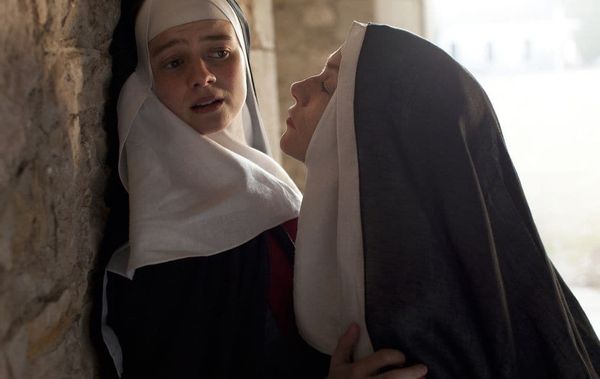Eye For Film >> Movies >> The Nun (2013) Film Review
The Nun
Reviewed by: Amber Wilkinson

Guillaume Nicloux has, alongside Jérôme Beaujour, crafted a stately and atmospheric adaptation of Denis Diderot's novel, which (like Child's Pose, also out this week) is driven onwards by a powerful central female performance.
Here is is Pauline Etienne who sweeps all before her as Suzanne Simonin, a nun who wants none of it. The youngster is nearing the end of her novitiate but has, in a move that typifies Diderot's Age of Enlightenment concerns, reasoned that despite her unyielding faith, the convent life is not for her. Solid reason lies at the core of everything Suzanne does from her rebellion to her stoicism. It is also the aspect of her personality which jars most with others - "You reason too much," she is told. No amount of rebellion of the heart, however, can free her from her circumstances, as her family simply cannot afford to let her leave - either financially, or on societal terms, where a retreat from devotion would be seen as shameful.

So Suzanne must stay and we accompany her through a sort of anti-pilgrim's progress, fraught with trials which expose the Church as a place where emotions much less inspiring than goodness and mercy can take root. Nicloux and cinematographer Yves Capes fully evoke the convent's confines, from the flicker of candles to the rustle of cloth in which each of the nuns is bundled. As Suzanne peers out from within the double prison of the cloister and her costume, we see a wide-eyed but throughtful naif, who is also fiercely determined. We don't need to touch the stone the novitiates are prostrate on to know that it is icy cold or to shake Suzanne's hand to sense that it is chilled and tremulous. And when she is later stripped of her habit and forced to wear little more than sackcloth, the early detailing pays off, so that Nicloux needs to do very little to suggest the depth of her hardship.
Initially, the film shows the cloister as a saviour of sorts, where under the wing of a benevolent Mother Superior (Francois Lebrun) girls might find shelter. But the less salubrious aspects of living in a confined space with others are soon exposed, whether it is the sadism of a second head nun (Louise Bourgoin), who is happy to brutalise those who disobey her or the sapphism of Isabelle Huppert's Sister Saint-Eutrope, whose sexual advances are equally disturbing. Away from the convent, the film feels less assured, with subsidiary characters never really having enough time to carve their mark, while there's a sense that society is getting off a little too lightly by comparison with the Church.
Reviewed on: 01 Nov 2013
















